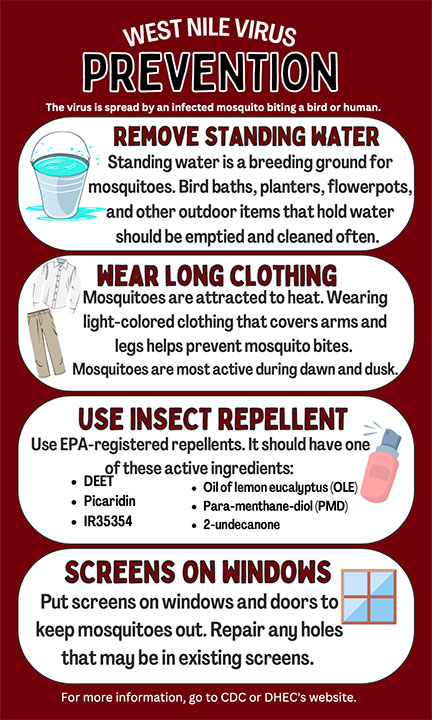Department of Health and Environmental Control logo. (Courtesy of SCDHEC)
James “Jim” Harrison Jr., a prominent Columbia lawyer, has died three weeks after contracting West Nile virus, according to family members.
Harrison’s family confirmed Monday he died from the virus, the same day that state health officials, without specifying a name, said a Richland County death was the first caused by the virus in the state this year. There are 11 confirmed cases statewide, nine of which are in the Midlands – six of those in Richland County, according to the S.C. Department of Health and Environmental Control.
Midlands residents are encouraged to use personal protective measures to prevent further outbreaks of the virus, the agency said.
Linda Bell, the state’s epidemiologist, said in a press release Friday that a majority of people infected with the virus are asymptomatic. Between 70 percent and 80 percent of those infected do not show symptoms. But the virus can lead to encephalitis, a potentially fatal inflammation of the brain. DHEC warned S.C. residents in an alert Friday that West Nile had been detected in Richland County.
“Though it occurs in less than 1 percent of people infected, (that) is reason enough for residents in Richland County to take this alert seriously and take the precautions advised,” Bell said.
Harrison served as a former Richland County public defender, assistant South Carolina attorney general and a city judge and was a partner in the firm of Harrison & Pleicones and a senior partner in the firm of Harrison, Radeker & Smith. He was 79 when he died.
About 1 in 5 people may develop other symptoms of the virus, including headache, body aches, joint pains, vomiting, diarrhea or rash, according to DHEC. Most people with symptoms fully recover. But fatigue or weakness may last weeks or months.
The city of Columbia on July 28 warned residents of a dead bird within city limits that had tested positive for West Nile. In response, the city sprayed for adult mosquitoes July 30 and 31.
West Nile is spread by a bite from a mosquito infected with the virus, usually after they feed on infected birds, according to New York State’s Department of Health.
Infected mosquitoes can spread the virus to humans and other animals.
DHEC’s website recommends eliminating all standing water outdoors, including in flowerpots, rain gutters and pet bowls.
The city also is urging residents to protect themselves using EPA-registered insect repellents, eliminating overgrown grass, weeds and shrubbery and packing tree holes with sand.
“If you develop fever or other symptoms after being bitten by a mosquito, you should contact your health care provider immediately,” Bell said in Monday’s press release.



